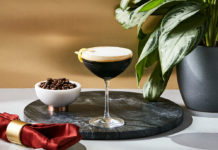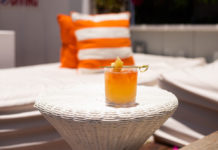 Exciting. Lively. Sexy. Fun. Unique. These are some of the words I’ve heard over the past 20 years describing what it’s like to be a part of the liquor industry. Let’s face it, something is intriguing about being in this space. It’s a great conversation starter. Imagine being at an event where a bartender is pouring a particular product, and you happen upon the founder of that brand. I’ve been there, and I can personally tell you it is a very proud moment.
Exciting. Lively. Sexy. Fun. Unique. These are some of the words I’ve heard over the past 20 years describing what it’s like to be a part of the liquor industry. Let’s face it, something is intriguing about being in this space. It’s a great conversation starter. Imagine being at an event where a bartender is pouring a particular product, and you happen upon the founder of that brand. I’ve been there, and I can personally tell you it is a very proud moment.
So, what does it take to get into this industry?
First of all, it’s no less daunting than any other venture. This business is competitive, regulated, and requires experience and capital. Much like cooking, where you can add your own unique flavor and personality to a signature dish, the liquor industry affords you the same opportunities. Take a shot! Get in there and bottle up your distinctive personality and showcase it to the world.
Selecting a Brand Name
Picking a brand name is very important. This title is what the world will come to know your brand as. Hopefully, you’ve visualized the name and how it looks. Your logo is exciting and speaks to the brand you are creating. I cannot stress enough the importance of exploring and researching your proposed brand name. Making sure a basic google search does not return any results directly in your space is vital. Assuming it’s clear there, the next step would be to make sure the appropriate URLs are available – including all the @names on social media. The goal here would be to have the name you want, the perfect URL(s), and all the social media channels so customers can quickly and consistently identify and connect with you. I’ve decided to put this at the beginning of this article because this is something that can and often do, require more time than most people think it would. After all, we’re naming our new baby here, and we want to pick the perfect name so let’s get it started at the very beginning.
Trademarking the name and the logo will be strongly recommended. The main point I want to leave you with on this topic is to make sure you trademark both the name AND the stylized mark for the brand you create. I’m not a trademark attorney, but I believe most trademark attorneys would heartily agree with this strategic approach.
Starting a Business
Let’s kick things off assuming we woke up today and wanted to start a vodka or whiskey. We’ve tossed around a few brand names that we’d like to build upon. These can be the basis for the names of the business possibly. So now it’s time to get some entities created. I strongly recommend setting your business up professionally and in an organized fashion from the very beginning. Let’s get in the habit of treating this venture as a real going concern and handle all matters pursuing this dream professionally.
Determining your entity type requires an analysis of your current situation, capital, partners, and plans. While there is no standard sure-thing, or go-to structure to put into play, I do believe you should consider thoroughly thinking thru your entry, AND exit strategies should. For example, if you plan to start the business and then secure investors in the near term as part of your launch plan, you may want to consider an LLC and explore the flexibilities built into that entity type as they pertain to operations, finances, etc. If your goal is to start a new brand and work towards being acquired by a major player in the space, you may want to consider a corporation or LLC as your preferred entity type.
However, if your goal is to start a brand and simply keep it family owned and a local story, other more basic types of entities may work well for you.
Remember, there are several tax, legal, accounting, and finance issues that you need to consider when determining which entity is best for you. Securing advice from someone with experience in the space can be some of the best up-front money you can spend as you work towards building your dream.
The Federal Government
The federal governing body for all things alcoholic is the United States Department of Treasury, Alcohol and Tobacco Tax and Trade Bureau., often referred to as the TTB. The TTB breaks the beverage alcohol world into three groups: Distilled Spirits, Beer, and Wine. At a federal level, you will need one or more of a variety of permit types, depending on what and how you plan to conduct business. You will also need to know that every label on an alcoholic beverage must meet certain standards and legal requirements. www.ttb.gov/alcohol is a great place to get specific detail and information concerning the federal regulatory piece.
State Government
Once you’ve handled the federal component, don’t get comfortable. Each state has their own Alcohol Beverage Division, and you will need to make sure you are state compliant as well. Keep in mind the state component cannot begin, for the most part, until AFTER you receive your federal permits and/or approvals. Typically, submitting a copy of the relevant federal documents is a critical element of most state filings.
The Three-Tiered System in the US
Briefly, the United States has a three-tiered system concerning the production and sale of alcoholic beverages:
Tier 1 – Producers and Importers (mainly the people who make the products)
Tier 2 – Wholesalers and Distributors (customers of Tier 1 businesses)
Tier 3 – Retailers (stores, bars, clubs, etc. and customers of Tier 2 businesses)
Tier 1 can only sell to Tier 2 (for the most part). Tier 2 can only sell to Tier 3. Tier 3 can only sell to the public. This tier system is the law. As a brand producer, securing Tier 2 customers will be the goal and main challenge. More on this later as we begin to explore the business and marketing plan(s).
Let the Fun Stuff Begin
So far, you probably think this information is on point and relevant. You also may be thinking this does NOT seem exciting, lively, sexy, fun, or unique. Like I said before, this is a business and I strongly recommend you cover the necessary steps and foundational matters very diligently and professionally. I promise you, the exciting stuff is coming!
Once you decide on which type of alcoholic beverage you want to create, I recommend writing a summary of your idea and answer the following two questions: 1) What will be unique about my product and brand that will cause people to want to buy it? 2) What price point would I like to see this product on the shelf at my local liquor/package store?
There are many opinions in this space on how to build a successful brand, and I agree to a certain extent with most all the ones I’ve come across during my time in this industry. I merely want you to think of it this way – say to yourself, “am I priced at a competitive point?” It is imperative to know your target retail price point and keep that goal in your sights as you work to develop and produce your product. The aim here is to be able to keep that target retail price in the picture as all of the production costs along the journey begin to unfold. The worst thing is not to be organized and aware of your development costs and find out that you’re now at a per unit COST that causes you to be TOO HIGH on the retail shelf. Take steps early on to keep your eyes on that target price and prize!
The Business Plan
An essential step to staying on track is to develop a thorough business plan. This business plan is crucial to building your brand and staying on budget and target. I want you to approach the business plan with the mindset that it is dynamic and will constantly be evolving and moving forward. In other words, it is not realistic to expect your dream brand to come to life without some hiccups along the way. We need to lean on the business plan to make sure we professionally and thoughtfully handle the entire evolution of this brand.
A vital component of the business plan will involve your marketing and promotional efforts for the brand. In other words, it’s not enough to just make something. We need to educate the market and let the world know we exist by taking capital and a strategized action plan to create the buzz and market for this new brand. Moreover, at some point, this will be a central component of your pitch to various wholesalers around the country you want to carry your product.
Now that you have a beverage and target retail price we can begin the journey of aligning with the right production partners and suppliers.
Finding the Right Production Partner
Who will make our product? Regardless if you are making a spirit, beer, or wine, there will be a fair amount of searching and analysis to arrive at the ideal production partner. Your distillery, brewery, or winery should be able to assist you with producing your product, logistically obtaining bottles, corks, caps, tops, labels, and boxes/cases. For the most part, this turnkey approach is a fine balance between cost efficiency and the added stress and headaches of you, as a newcomer to the space, trying to coordinate all the production components and moving parts.
The design work and creative will be your responsibility. I’m confident various production partners can steer you to local resources along the way if you need them – and that can be a good thing. For instance, let’s say you create a wonder label with your local designer and want to produce them. You can either produce them locally as well or take a recommendation for the printing from your production partner that is local to them (where they will be bottling and labeling anyway). It’s possible the freight cost savings could be beneficial to the project long term.
In short, each distillery, brewery, and/or winery will have their own distinct and unique style and method of producing your product. It’s my experience that most masters and makers will be more than happy to work with you to discuss all the elements and steps along the way and things you can do to make your product exactly what you want it to be. This collaboration is their art, and they are true masters, and their passion is infectious. Enjoy the experience!
The Finish Line is in Sight
By this point, hopefully, you’re well on our way to the full production of your decided upon final product. You’ve got your brand name and logo designed, and your packaging is fresh and exciting. You’re starting to visualize your product on the shelf and the back bar in your favorite restaurants and bars.
Before you pull that plug and swing into full production, let’s get some finalized product(s) in the hands of some talented folks to make the sales pitch to some wholesalers/distributors. I strongly recommend that you approach this very structured and professionally. This point is where the wholesalers are going to really see the brand and who you are as a viable company behind the brand. These folks are going to want to know the product is excellent quality, unique, looks impressive, and has sturdy legs behind it from a capital AND workforce standpoint. When the stars align, and there is a MUTUAL good feeling between the brand and the chosen wholesaler partner, the magic begins.
The key here is to remember that wholesalers are not just customers of the brand. These folks are vital elements to the success of your brand. You’ve poured your heart and soul and finances into creating something very special to you. We want to select the right wholesaler who will embrace the brand and get on board with you.
Remember, at the end of the day, this is your brand. It’s your responsibility to take the lead on all things marketing and promotional. It’s your responsibility to let the masses know you exist.
Our One Year Anniversary
It’s now been a year since we aligned with our first wholesaler. It’s been an exciting year. We’ve had the opportunity to brief the entire on and off-premise teams with our wholesaler. They’ve done a great job introducing the brand to their key account. The brand has achieved great success with initial placements. All things are pointed up for the brand.
Keep it up. Don’t rest. Staying fresh and keeping your marketing and promotional events new and exciting is critical. Where allowable, go ahead and run spiffs and incentives and awards for the sales reps and management of your wholesalers. Everything you do is a step in the long process of building a remarkable brand and business. That’s building VALUE!
Now that you have one or two great relationships with wholesalers let that be the model for how you will approach other markets. Feel free to use those success stories as you build and expand. Don’t be afraid to focus on the failures too. That’s where true learning and experience live.








